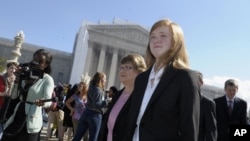From VOA Learning English, this is the Education Report.
The United States Supreme Court said last week it will re-hear arguments on a controversial college admissions policy. The case involves affirmative action, the custom of helping groups that have been treated unfairly in the past.
The Supreme Court plans to hear the case of Abigail Fisher for the second time. Ms. Fisher, a white female, was denied admission to the University of Texas at Austin in 2008. She says the university’s affirmative action policy discriminated against her and other white applicants.
Ms. Fisher took legal action against the University of Texas. Her case went to the U.S. Supreme Court in 2013. The court sent the case back to a lower court, which supported the university.
In 2003, the Supreme Court ruled that schools can consider an applicant’s race as part of their admissions decisions. The court’s majority said that schools have a “compelling interest” in having a racially-mixed student population.
Michael Yaki is a member of the U.S. Civil Rights Commission. He says affirmative action is a good thing. He says race should not prevent someone from getting into a university. But he thinks it should be a consideration when university officials want to create balance in a class.
In his words, “Our nation is stronger when people from diverse cultures and diverse backgrounds can work, live and study together.” He adds that affirmative action will “benefit the society and benefit our future.” Supporters say affirmative action is needed to increase economic and other opportunities for some minority groups.
Tom Fitton is president of Judicial Watch, a policy group in Washington D.C. He says colleges should make decisions based only on a student’s ability or merit. He says race-based admissions programs are a violation of the U.S. Constitution.
“People are harmed by these decisions,” he says, “because for every person who gets in because they are a minority, there is someone who may be left out because they are not.”
Mr. Fitton says affirmative action hurts Asian-American students. The 2010 Census found that Asian Americans make up about six percent of the U.S. population. But they make up about 40 percent of the undergraduate students at the University of California at Berkeley. At Harvard University, 20 percent of the first-year students are Asian. Some people say the percentage of Asian students at top U.S. universities would be even higher without affirmative action.
“The Asian American community gets harmed by this, because their educational achievements make them excellent candidates, if it was just based on merit,” Mr. Fitton says.
A group of Asian organizations complained to the Justice and Education Departments. They said Harvard University discriminates against Asian Americans in its admission process. Commissioner Yaki does not think Harvard “systematically” discriminates against them. He says the university does not set firm target numbers for the number of Asians it will accept.
In 1978, the Supreme Court ruled that racial quotas are illegal in employment and college admissions.
Abigail Fisher now works at a finance company after completing studies at Louisiana State University. The Supreme Court will hear her case against the University of Texas in October. The Court’s decision could have a major effect on the diversity of U.S. college classrooms in the future.
I’m Anne Ball.
Yang Chen reported this story for VOA. Adam Brock adapted it for Learning English. George Grow was the editor.
______________________________________________________________
Words in This Story
controversial – adj. relating to or causing much discussion, disagreement, or argument
affirmative action – n. the custom of improving the educational and job opportunities of members of groups that have not been treated fairly in the past because of their race, sex, etc.
discriminate – v. to unfairly treat a person or group of people differently from other people or groups
merit – n. the quality of being good, important, or useful
racial quota – n. a numerical requirement for hiring, promoting, admitting and/or graduating members of a particular racial group
complain – v. to report that you are unhappy or sick, or that you do not like something





